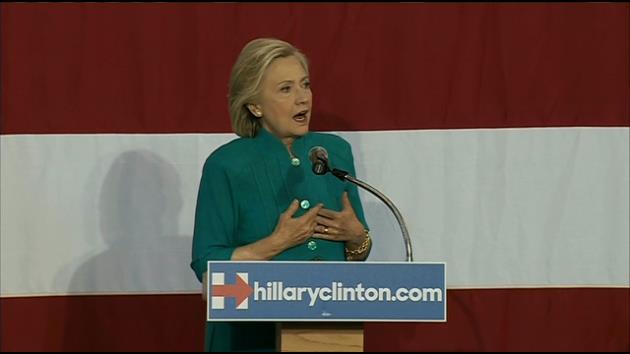By BILL BARROW
Associated press
ATLANTA (AP) – As part of her promise to address rising college costs, Democratic presidential candidate Hillary Rodham Clinton is calling to expand the AmeriCorps service program launched under her husband’s administration.
Clinton calls for spending about $20 billion over 10 years on the expansion, increasing the number of civil service volunteers from 75,000 to 250,000 and more than doubling the educational grant that enrollees can receive.
The plan, which the campaign shared with The Associated Press, is part of Clinton’s $350 billion "new college compact" that she outlined last week amid a rising outcry – particularly fierce among the Democratic Party’s liberal wing and young, disaffected voters – over the climbing costs of attending college.
"Young people willing to commit to public service deserve to live free from the crushing burden of student debt," Clinton said in a statement Thursdsay. "In the same way we provided for our returning veterans with the GI Bill, we must commit to those who serve our communities at home."
AmeriCorps volunteers currently can receive up to $11,550 for two years of full-time service in sectors ranging from education to environmental awareness, with the amount being treated as taxable income. Clinton proposes a maximum award or more than $23,000 and to make the money tax free, as Pell Grants are treated under existing tax rules.
Last week, Clinton detailed other anchors of her college affordability plan. Among other things, she proposes a $200 billion system of incentives to encourage states to guarantee "no loan" tuition rates at four-year universities and eliminate in-state tuition at community colleges. And she has called for allowing existing debtors to refinance their student loans.
Clinton proposes covering the price tag for those ideas and the AmeriCorps expansion by capping itemized tax deductions for the nation’s wealthiest families at 28 percent of their taxable income. That is already the cap for charitable contributions and mortgage interest. The change would generate more than $600 billion over 10 years, according to the Treasury Department.
The Clinton campaign has planned its higher-education policy rollout to coincide with the start of another school year, when hundreds of thousands of students are getting their bursar’s bills and taking out new rounds of loans.
National student debt is near $1.3 trillion dollars, while the College Board reports that the average price for in-state students at public four-year universities is 42 percent higher than it was a decade ago.
Clinton’s ideas still do not match the plans of her closest primary rival. Vermont Sen. Bernie Sanders has pitched a $70 billion plan to eliminate tuition and fees for public universities paid for by taxing investment transactions involving hedge funds, investment houses and other Wall Street firms.
Any of the Democratic proposals would face steep odds on Capitol Hill, where Republicans are unlikely to adopt any significant tax hikes to pay for new spending measures. Many Republican also argue that any public spending to subsidize tuition simply encourages colleges and universities to continue raising rates.
——
Follow Barrow on Twitter at https://twitter.com/BillBarrowAP.
Copyright 2015 The Associated Press. All rights reserved. This material may not be published, broadcast, rewritten or redistributed.

